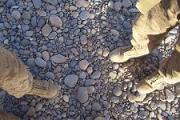Her current piece is The Value of Kosovo as a Non-Legal Precedent (by Ashley Deeks, August 24, 2013). She references a current NYT article, Air War in Kosovo Seen as Precedent in Possible Response to Syria Chemical Attack (August 23, 2013); and her own 2012 post, Syria, Chemical Weapons, and Possible U.S. Military Action (by Ashley Deeks, December 10, 2012). That 2012 post outlines possible policy and legal arguments that the Obama NSC team might make to support US military action if Syria uses or threatens to use chemical weapons.
Her post today refines what the "Kosovo" argument is - and what it is not. First off, Kosovo is not a good legal precendent - she agrees with Goldsmith on that:
Here is the "Kosovo" argument in a Deeks nutshell:Jack’s post makes the point that the Kosovo precedent won’t get the U.S. government very far if it is looking for a solid international legal precedent for intervention in Syria. That seems absolutely right. But it also seems worth asking: if Kosovo isn’t a good legal precedent for Syria, how good a precedent is it in the policy, practical, and moral realms? Should the U.S. government cite Kosovo as a precedent at all?
And here is the Deeks crystal ball:Enter Kosovo. The NYT today [link above] identifies that the Obama Administration is looking to the 1999 Kosovo air war as precedent for action in Syria. As many readers will recall (and as I discussed briefly here [link above]), virtually none of the NATO states that participated in the Kosovo bombings offered legal justifications for their actions. Instead, their diplomats explained why their actions were legitimate as a moral and policy matter.
This is known in some corners as the “factors” approach, the idea being that there was an unusual confluence of factors that made it imperative for NATO to intervene, but those factors were so many and so distinct that it would be difficult for states in the future to claim Kosovo as a precedent for actions seen as less desirable by the international community writ large.
The clearest statement of the factors that the U.S. found relevant in the Kosovo context can be found in a March 23, 1999 press statement by State Department spokesperson Jamie Rubin (preserved here). Here is the core defense of the U.S.’s role in NATO action in Kosovo ...
It would not surprise me if missiles fly soon in a non-war war by a "coalition of the pi$$ed" - to borrow a Gabriella Blum term. President Obama is in something of a corner; and my mind says he is not a person who backs down readily from a moral position he has expressed. I don't like that COA, but it "feels" likely to me.Fast forward to Syria. A number of the Kosovo factors have clear parallels in the Syria context: serious refugee flows; the likelihood of destabilizing the region further (see Lebanon); a (likely) multi-lateral coalition supporting action; general disregard for (soft) UN Security Council Resolutions; and serious, widespread violations of international law. Some of the Kosovo factors don’t resonate (no peace agreements; the coalition that would act is not from the same geographic region in which the humanitarian crisis is taking place). But the United Nations now has what looks like pretty conclusive evidence that Assad’s regime has used chemical weapons – a factor absent in Kosovo but critical in the Syria factors column for sure.
Though the Times quotes a senior Administration official as saying, “It’s a step too far to say we’re drawing up legal justifications for an action, given that the president hasn’t made a decision,” that doesn’t actually ring true. Either the speaker was hinting at the fact that the U.S. justifications for using force in Syria are unlikely to be legal ones, or the official is being coy. Dollars to donuts says that State, Defense, Justice, and NSC lawyers are hard at work, maybe in conversations with close NATO allies, drawing on the Kosovo non-precedent precedent to shape the argument that intervention in Syria is legitimate, if not lawful.
Regards
Mike












Bookmarks